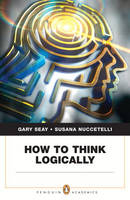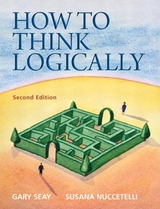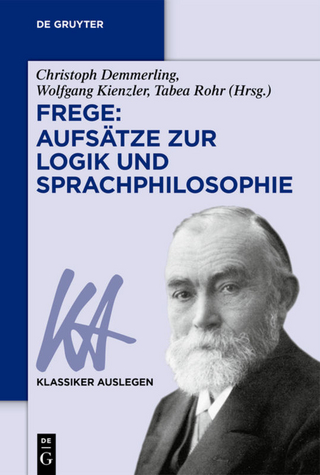
How to Think Logically
Pearson (Verlag)
978-0-321-33777-1 (ISBN)
- Titel erscheint in neuer Auflage
- Artikel merken
The author’s presentation strikes a careful balance: it offers clear, jargon-free writing while preserving rigor. Brimming with numerous pedagogical features this accessible text assists students with analysis, reconstruction, and evaluation of arguments and helps them become independent, analytical thinkers. Introductory students are exposed to the basic principles of reasoning while also having their appetites whetted for future courses in philosophy.
Gary Seay has taught logic at the City University of New York since 1979 and is currently Associate Professor of Philosophy at Medgar Evers College. He is the author of journal articles on moral philosophy and bioethics. With Susana Nuccetelli, he is the editor of Latin American Philosophy (Prentice Hall, 2004). Susana Nuccetelli is Associate Professor of Philosophy at St. Cloud State University in Minnesota. She is editor of New Essays on Semantic Externalism and Self-Knowledge (MIT Press, 2003) and author of many journal articles on epistemology and philosophy of language. She has also written on Latin American philosophy.
Preface
Acknowledgments
About the Authors
PART I: THE BUILDING BLOCKS OF REASONING
CHAPTER ONE
What Is Logical Thinking? And Why Should We Care?
1.1 The Study of Reasoning
Inference or Argument
1.2 Logic and Reasoning
Dimensions of the Subject
Formal Logic
Informal Logic
EXERCISES
1.3 Arguments and Non-Arguments
1.4 Argument Analysis
Reconstructing and Evaluating Arguments
Identifying Premises and Conclusion
Premise and Conclusion Indicators
Arguments with No Premise or Conclusion Indicator
EXERCISES
1.5 The Philosopher’s Corner
What is Philosophical About All This
EXERCISES
WRITING PROJECT
1.6 Chapter Summary
1.7 Key Words
CHAPTER TWO
Thinking Logically and Speaking One’s Mind
2.1 Rational Acceptability
Logical Connectedness
Evidential Support
Truth and Evidence
2.2 Beyond Rational Acceptability
Linguistic Merit
Retorical Power
Rhetoric vs. Logical Thinking
EXERCISES
2.3 From Belief to Statement
Propositions
2.4 Uses of Language
Types of Sentence
Declarative Sentences
2.5 Indirect and Non-Literal Language
Indirect Language
Non-Literal Language
EXERCISES
2.6 The Philosopher’s Corner
The Study of Language and Its Dimensions
Type and Token
Use and Mention
EXERCISES
WRITING PROJECT
2.7 Chapter Summary
2.8 Key Words
CHAPTER THREE
The Virtues of Belief
3.1 Belief, Disbelief, and Non-Belief
EXERCISES
3.2 Beliefs’ Virtues and Vices
3.3 Accuracy and Truth
Accuracy and Inaccuracy
Truth and Falsity
3.4 Reasonableness
Empirical and Conceptual Reasonableness
3.5 Consistency
Defining `Consistency’ and `Inconsistency’
Logically Possible Propositions
Logically Impossible Propositions
Consistency and Possible Worlds
Consistency in Logical Thinking
3.6 Conservatism and Revisability
Conservatism Without Dogmatism
Revisability Without Relativism
3.7 Rationality vs. Irrationality
EXERCISES
3.8 The Philosopher’s Corner
Evaluative Reasons
EXERCISES
WRITING PROJECT
3.9 Chapter Summary
3.10 Key Words
PART II: REASON AND ARGUMENT
CHAPTER FOUR
Tips for Argument Analysis
4.1 A Principled Way of Reconstructing Arguments
Faithfulness
Charity
When Faithfulness and Charity Conflict
4.2 Missing Premises
4.3 Extended Arguments
EXERCISES
4.4 Types of Reason and Types of Argument
Deductive vs. Inductive Arguments
4.5 Evaluative Arguments with Missing Premises
Evaluative Arguments
Moral Arguments and Moral Principles
Implicit Evaluative Premises
EXERCISES
4.6 The Philosopher’s Corner
Can `Ought’ Follow Deductively from `Is’? Hume’s Position
Searle’s Reply
EXERCISES
WRITING PROJECT
4.7 Chapter Summary
4.8 Key Words
CHAPTER FIVE
Evaluating Deductive Arguments
5.1 Valid Arguments
`Validity’ as a Technical Term
EXERCISES
Some Valid Propositional Argument Forms
Some Valid Syllogistic Argument Forms
The Cash Value of Validity
EXERCISES
5.2 Sound vs. Unsound Arguments
The Cash Value of Soundness
5.3 Cogent vs. Non-Cogent Arguments
The Cash Value of Cogency
EXERCISES
5.4 The Philosopher’s Corner
Deductive Arguments and the A Priori/A Posteriori Distinction
EXERCISES
WRITING PROJECT
5.5 Chapter Summary
5.6 Key Words
CHAPTER SIX
Analyzing Inductive Arguments
6.1 Reconstructing Inductive Arguments
What Is an Inductive Argument?
6.2 Some Types of Inductive Argument
Enumerative Induction
Statistical Syllogism
Causal Argument
Analogy
EXERCISES
6.3 Evaluating Inductive Arguments
Inductive Reliability
Inductive Strength
EXERCISES
6.4 The Philosopher’s Corner
Is Natural Science Inductive?
EXERCISES
WRITING PROJECT
6.5 Chapter Summary
6.6 Key Words
PART III: INFORMAL FALLACIES
CHAPTER SEVEN
Some Ways an Argument Can Fail
7.1 What Is a Fallacy?
7.2 Classification of Informal Fallacies
7.3 When Inductive Arguments Go Wrong
Hasty Generalization
Weak Analogy
False Cause
Appeal to Ignorance
Appeal to Unqualified Authority
EXERCISES
7.4 The Philosopher’s Corner
Appeal to Ignorance in Philosophical Arguments
EXERCISES
WRITING PROJECT
7.5 Chapter Summary
7.6 Key Words
CHAPTER EIGHT
Avoiding Ungrounded Assumptions
8.1 Fallacies of Presumption
8.2 Begging the Question
Circular Reasoning
The Burden of Proof
8.3 Begging-the-Question-Against
EXERCISES
8.4 Complex Question
8.5 False Alternatives
8.6 Accident
EXERCISES
8.7 The Philosopher’s Corner
Is the Open Question Argument Viciously Circular?
EXERCISES
WRITING PROJECT
8.8 Chapter Summary
8.9 Key Words
CHAPTER NINE
From Unclear Language to Unclear Reasoning
9.1 Unclear Language and Argument Failure
9.2 Semantic Unclarity
9.3 Vagueness
The Sorites Paradox
The Slippery Slope Fallacy
9.4 Ambiguity
Equivocation
Amphiboly
9.5 Confused Predication
Composition
Division
9.6 Antidote to Unclear Language: Semantic Definitions
Reportive Definitions
The Method of Counterexample
Ostensive and Contextual Definitions
9.7 The Philosopher’s Corner
Real Definitions
Philosophical Analysis
EXERCISES
WRITING PROJECT
9.8 Chapter Summary
9.9 Key Words
CHAPTER TEN
Avoiding Irrelevant Premises
10.1 Fallacies of Relevance
10.2 Appeal to Pity
10.3 Appeal to Force
10.4 Appeal to Emotion
The Bandwagon Appeal
Appeal to Vanity
10.5 Ad Hominem
The Abusive Ad Hominem
Tu Quoque
Non-Fallacious Ad Hominem
10.6 Beside the Point
10.7 Straw Man
EXERCISES
10.8 The Philosopher’s Corner
Is the Appeal to Emotion Always Fallacious?
EXERCISES
WRITING PROJECT
10.9 Chapter Summary
10.10 Key Words
PART IV: MORE ON DEDUCTIVE REASONING
CHAPTER ELEVEN
Compound Propositions
11.1 Argument as a Relation Between Propositions
11.2 Simple and Compound Propositions
Negation
Conjunction
Disjunction
Material Conditional
Material Biconditional
11.3 A Closer Look at Compound Propositions
Punctuation Symbols
Well-Formed Formulas
EXERCISES
11.4 Defining Connectives with Truth Tables
11.5 Truth Tables for Compound Propositions
11.6 Logically Necessary and Logically Contingent Propositions
Tautologies
Contradictions
Contingencies
EXERCISES
11.7 The Philosopher’s Corner
Tautologies and Other Necessary Propositions
EXERCISES
WRITING PROJECT
11.8 Chapter Summary
11.9 Key Words
CHAPTER TWELVE
Checking the Validity of Propositional Arguments
12.1 Checking Validity with Truth Tables
EXERCISES
12.2 Reviewing Some Standard Argument Forms
Modus Ponens
Modus Tollens
Contraposition
Hypothetical Syllogism
Disjunctive Syllogism
EXERCISES
12.3 Formal Fallacies
Affirming the Consequent
Denying the Antecedent
Affirming a Disjunct
EXERCISES
12.4 An Informal Approach to Proofs of Validity
The Basic Rules
What Is a Proof of Validity
How to Construct a Proof of Validity
Proofs vs. Truth Tables
EXERCISES
12.5 The Philosopher’s Corner
Reductio ad Absurdum Arguments
Reductio in Philosophy
EXERCISES
WRITING PROJECT
12.6 Chapter Summary
12.7 Key Words
CHAPTER THIRTEEN
Categorical Propositions
13.1 What Is a Categorical Proposition?
Categorical Propositions
Standard Form Categorical Propositions
Non-Standard Categorical Propositions
EXERCISES
13.2 Venn Diagrams for Categorical Propositions
EXERCISES
13.3 The Square of Opposition
The Traditional Square of Opposition
Existential Import
The Modern Square of Opposition
EXERCISES
13.4 Other Immediate Inferences
Conversion
Obversion
Contraposition
EXERCISES
13.5 The Philosopher’s Corner
Generalization and the Appeal to Counterexample
EXERCISES
WRITING PROJECT
13.6 Chapter Summary
13.7 Key Words
CHAPTER FOURTEEN
Categorical Syllogisms
14.1 What Is a Categorical Syllogism
Recognizing Categorical Syllogisms
14.2 Mood and Figure
EXERCISES
14.3 Testing for Valid ity with Venn Diagrams
EXERCISES
14.4 Distribution of Terms
14.5 Rules of Validity and Fallacies
EXERCISES
14.6 The Philosopher’s Corner
Standard Syllogisms and Singular Propositions
EXERCISES
WRITING PROJECT
14.7 Chapter Summary
14.8 Key Words
Appendix: Summary of Informal Fallacies
Answers to Selected Exercises
Glossary/Index
| Erscheint lt. Verlag | 7.9.2007 |
|---|---|
| Sprache | englisch |
| Maße | 209 x 134 mm |
| Gewicht | 533 g |
| Themenwelt | Geisteswissenschaften ► Philosophie ► Logik |
| ISBN-10 | 0-321-33777-8 / 0321337778 |
| ISBN-13 | 978-0-321-33777-1 / 9780321337771 |
| Zustand | Neuware |
| Haben Sie eine Frage zum Produkt? |
aus dem Bereich



